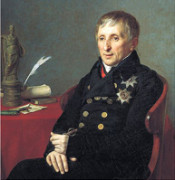
Birthday anniversary of Alexei Olenin, Russian statesman, historian, archaeologist, artist, writer and collector
November 28 (December 9), 1763 in Moscow was born Alexei Nikolaevich Olenin, Count, Russian statesman, historian, archaeologist, artist, writer and collector. Olenin was a great connoisseur of classical and Russian antiquities, was engaged in engraving, studied the art of medal, was the author of the first studies on the history of the Russian ancient garments, as well as illustrations to the 1st edition of the poems of Pushkin's "Ruslan and Ludmila."
In 1774, Olenin was taken to the house of his relative Princess E. Dashkova and, at the behest of the Empress Catherine II, joined the Corps of Pages, and six years later was sent to Dresden Artillery School. Upon his return to Russia Olenin served in the artillery, and in May 1786 was elected a member of the Russian Academy owing to his work "interpretation of many ancient Russian military sayings." From 1789 to 1795 Olenin had served in the Pskov Dragoon Regiment and participated in the Swedish and Polish campaigns. In April 1795, he entered the Assignation Bank, and soon became the head of an office for purchase of metals, and then - the Mint director.
In 1808, Olenin was made the assistant director of the Imperial Library, and in October 1811 was appointed director of the Imperial Public Library.
Olenin got involved in the work of the library the leading cultural figures of his time (poet and translator N. I. Gnedich, fabulist I. A. Krylov, linguist A. H. Vostokov). He personally contributed a lot to the arrangement and enrichment of the book depository. To bring the book collections in order Olenin published the first guide - "Experience of a new bibliographic order for the St. Petersburg Imperial Library”. In order for the books to be described in the same way, the "Rules for compiling the directories of the Imperial Public Library in alphabetical order" were issued in 1819. One of the main objectives the first director of the Public Library regarded the collecting of the complete repertoire of Russian and Church Slavonic books from the beginning of printing. A special Russian department was created in the library, accenting its national character. Under the leadership of Olenin the library was in fourth place according to the number of items among the major European libraries.
In Olenin’s opinion, the library was intended primarily for education, for collecting and providing to Russians items of science, literature, art, and for the moral education of youth. In line with this, he developed its funds and organized the service. Olenin managed the Imperial Public Library for about 35 years. His energy, initiative, high reputation contributed to the formation of the image of the library as the leading scientific and cultural center of Russia.
In April 1817 Olenin became president of the Imperial Academy of Arts. During his presidency substantial construction works were carried out, inside the Academy and on its territory as well. Olenin had made changes in curriculum too, reducing the period of a course to six years. Under his leadership the Academy opened a model class, acquired valuable statues and Etruscan vases, developed the museum's collection.
The famous salon of Olenins’ had played an important role in the history of the Russian enlightenment of the first third of the 19th century, uniting the figures of science and art. According to one researcher, "there is no biography of a national writer, from Derzhavin to Pushkin, which would not include a page devoted to the memory of Olenin, there was not an artist or an actor, whom Olenin would not receive warmly in his living room."
During the period of his work in the Imperial Public Library and the Academy of Arts, Olenin continued to receive appointments to various state posts. He was a member of the Council of State, Secretary of State, a member of the General Directorate of censorship, the Commission for the construction of St. Isaac's Cathedral, the Committee for building of Triumphal Arch, was a member of various literary and scientific societies, was an honorary member of the Academy of Science. Olenin was awarded several decorations: the Commander's Cross of the Order of St. John of Jerusalem, the Order of Vladimir, 1st class, of Anna 1st and 2nd class and a gold medal on St. Vladimir ribbon, held the rank of the actual privy councilor.
Alexei Nikolaevich Olenin died 17 (29) April, 1843 and was buried at the Tikhvin cemetery of Alexander Nevsky Lavra in St. Petersburg.
Lit.: Голубева О. Д. Хранители мудрости. М., 1988; Она же. Что рассказали автографы. СПб., 1991; Она же. А. Н. Оленин. СПб., 1997; Она же. Оленин Алексей Николаевич [Электронный ресурс] // Российская национальная библиотека. 2003. URL: http://nlr.ru/nlr_history/persons/info.php?id=127; Кубасов И. А. Алексей Николаевич Оленин (1763-1843). СПб., 1904; Оленин А. Н. Краткое историческое сведение о состоянии Императорской Академии Художеств с 1764 по 1829 год. СПб., 1829; Он же. Археологические труды: В 2 т. СПб., 1877-1882; Прийма Ф. Я. Пушкин и кружок А. Н. Оленина // Пушкин: Исследования и материалы. М.; Л., 1958. Т. 2. С. 229—246; То же [Электронный ресурс]. URL: http://feb-web.ru/feb/pushkin/serial/is2/is2-229-.htm; Созинова С. Ф. Общественная и научная деятельность А. Н. Оленина // Государство, политика и идеология в античном мире. Л., 1990. С. 171—197; Стояновский Н. И. Алексей Николаевич Оленин, 1763-1843 //PC. 1875. Т. 14, № 10; Он же. Очерк жизни Алексея Николаевича Оленина //Оленин А. Н. Археологические труды. СПб., 1881. Т. 2; Тимофеев Л. В. В кругу друзей и муз: Дом А. Н. Оленина. Л., 1983.
Based on the Presidential Library’s materials:

